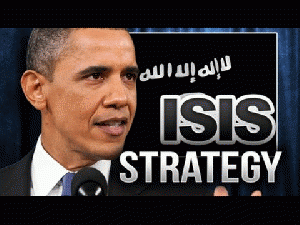Cross-posted from WSWS
The accelerating drive to a new US war in the Middle East, extending from Iraq to Syria and potentially beyond, has laid bare a stark contradiction between President Barack Obama's public rejection of any US "boots on the ground" and increasingly assertive statements by top generals that such deployments cannot be ruled out.
Underlying this semi-public dispute between the US president -- the titular "commander-in-chief" -- and the military brass are the realities underlying another war of aggression being launched on the basis of lies for the second time in barely a decade.
It is being foisted on the American public as an extension of the 13-year-old "global war on terror," with Obama warning this week that the Islamic State of Iraq and Syria (ISIS) "if left unchecked" could pose a growing threat to the United States."
In reality, the ISIS threat, such as it is, stems entirely from US imperialist interventions that have ravaged first Iraq, through a war and occupation that claimed some one million lives, and then Syria, in a US-backed sectarian war for regime-change -- in which ISIS was the beneficiary of arms and aid from the US and its regional allies -- that has killed well over 100,000 and turned millions into refugees.
The collapse of Iraq's security forces in the face of an ISIS offensive that was part of a broader Sunni revolt against Iraq's US-installed Shi'ite sectarian government is now being used as the justification for a US military intervention aimed at reasserting US military dominance in Iraq, intensifying the war to overthrow the Assad regime in neighboring Syria, and escalating the confrontations with the key allies of Damascus -- Iran and Russia.
Such strategic ambitions cannot be achieved with such unreliable proxy forces as the Iraqi military and the so-called Syrian "rebels." They require the unrestrained use of Washington's military might. This is why the generals are publicly challenging the blanket commitment made by Obama ruling out any US ground war in Iraq or Syria.
Over the past several days, both White House and Pentagon spokesmen have issued "clarifying" statements in an attempt to smooth over what increasingly suggests something close to insubordination by the top uniformed brass against the president.
The Washington Post pointed to the conflict Friday in a lead article entitled "In military, skepticism of Obama's plan," writing, "Flashes of disagreement over how to fight the Islamic State are mounting between President Obama and US military leaders, the latest sign of strain in what often has been an awkward and uneasy relationship."
The first major public airing of the divisions between the military command and the White House came Tuesday in congressional testimony in which Gen. Martin Dempsey, the chairman of the Joint Chiefs of Staff, stated that circumstances in Iraq and Syria could require the introduction of US ground troops and he would not rule out their deployment. He added that the commander of CENTCOM, which oversees US military operations in the Middle East, had already proposed the intervention of US troops in the campaign to retake the Mosul dam last month, but had been overruled by the White House.
A day later, Obama appeared to rule out such action even more categorically, telling a captive audience of US troops at MacDill Air Force Base Wednesday: "As your commander-in-chief, I will not commit you and the rest of our Armed Forces to fighting another ground war in Iraq."
This hardly settled the question, however. Speaking on the same day as the president, Gen. Ray Odierno, the Army chief of staff and former top US commander in Iraq, told journalists that air strikes would prove insufficient to achieve Washington's ostensible goal of destroying ISIS. "You've got to have ground forces that are capable of going in and rooting them out," he said.
Odierno intensified his argument on Friday, telling reporters that air strikes alone would grow increasingly problematic as ISIS forces intermingled with Iraq's civilian population.
"When you target, you want to make sure you are targeting the right people," the Army commander said. "The worst thing that can happen for us is if we start killing innocent Iraqis, innocent civilians." He added that US ground forces would be needed to direct the bombing campaign.
Odierno referred to the 1,600 US troops the Obama administration has already deployed to Iraq as "a good start," but added that as the US military campaign developed, so too could the demand for further deployments. "Based on that assessment we'll make further decisions," he said.
The Army chief warned that the US was embarking on a protracted war in the region. "This is going to go on," he said. "This is not a short term -- I think the president said three years. I agree with that -- three years, maybe longer. And so what we want to do is do this right. Assess it properly, see how it's going, adjust as we go along, to make sure we can sustain this."
(Note: You can view every article as one long page if you sign up as an Advocate Member, or higher).





